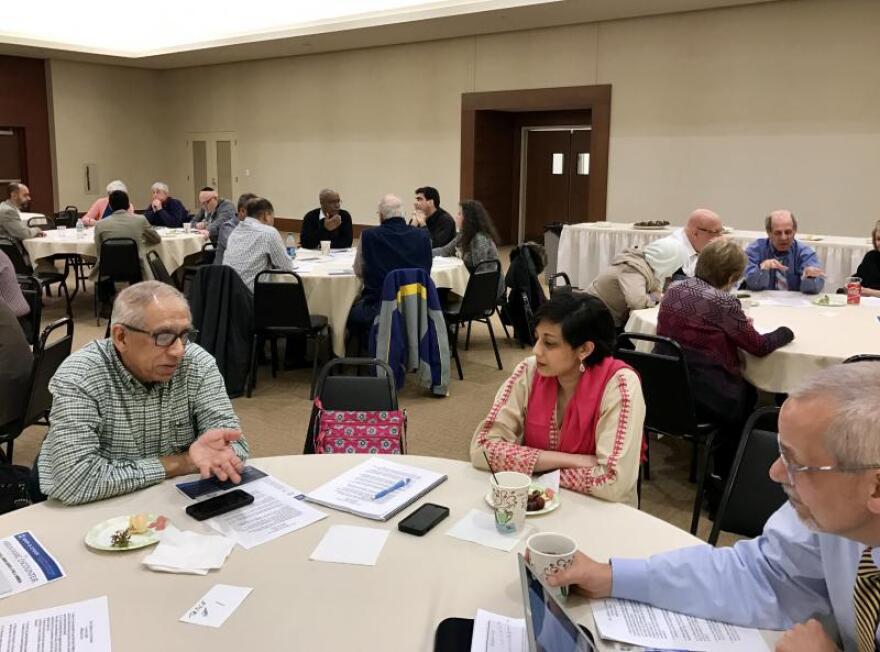Sunday marks the culmination of one discussion among Jews and Muslims in Northeast Ohio -- and the start of another one. The local dialogue predates Charlottesville, the Muslim travel ban and the election of Donald Trump.
But all of those developments have lent an urgency to the effort to get the Children of Abraham, and beyond, talking.
For nearly two years – one month at a synagogue and the next at a mosque – local Muslims and Jews have been getting together for a light meal and a heavy discussion.
Among the topics: Jerusalem, religious tolerance and just how to understand what are delicately called “the difficult text.” That includes one in the Old Testament that seems to advocate killing an entire tribe of men, women and children, as well as its counterpart in the Qur’an about smiting the necks of unbelievers.
In March, Allia Haque and Rabbi Josh Brown struggled through such passages at one of about a dozen tables at Temple Israel in Akron.
“I personally see it as a test of faith, to see how important interpretation is," Haque said.
“Maybe I feel this personally because of my role as a rabbi, but it gives religion a bad name,” Brown added. “There are people who say, ‘I don’t want to be part of organized religion. Organized religion just hurts people and divides people.’”
The format for the 11 sessions comes from a national curriculum called “Children of Abraham: Jews and Muslims in Conversation,” developed in 2007 by the Union for Reform Judaism and the Islamic Society of North America.
The local passion for the project came from Dr. Ghulham Mir of the Islamic Society of Akron and Kent and Art Krakauer of Temple Israel. Muslims and Jews are small minorities in America and Ohio, they note, so they expected there would be some shared interests.
The results have surprised even them.
“What surprised us is that we have come this far and become such good friends, brothers and sisters," Mir said.
"We’re actually able to lay the cards on the table on difficult questions, and have an honest conversation," Krakauer added.
 The outreach includes inviting people to prayers at the Islamic Center of Akron and Kent.
The outreach includes inviting people to prayers at the Islamic Center of Akron and Kent.
Credit M.L. Schultze / WKSU
Islamophobia and Anti-Semitism
The group had been drawing 40 to 50 people each month.
The last session was at the Islamic Society, a soaring white building in Cuyahoga Falls undergoing a major expansion. More than 100 people attended, with many coming from outside the two congregations.
July’s topic was anti-Semitism and Islamophobia, a month before white nationalists chanted against Jews in Charlottesville, but after attacks on Muslims, mosques, temples and Jewish cemeteries around the country.
Each table had a different question to answer. One was how to respond when someone makes an offensive religious comment.
Cuyahoga Falls police chief Jack Davis was among those working on the answer. After all, his city, once jokingly known as Caucasian Falls, is now home to the largest mosque in the area and an increasingly diverse population.
Still, Davis acknowledged, he occasionally runs into a raised eyebrow and a comment about “those people.”
“I’ll get that,” he says. “I’ll get, ‘You know what’s going on at that Islamic center.’ ‘Yeah, they’re teaching children and they’re having services, like every other church and school in our city.’”
Davis, Ahmad Deeb and a half-dozen others at the table came up with a response they think can make a difference.
Deeb suggested a step-by-step approach.
‘Step one is, ‘Why do you believe this?’ so as not to de-legitimize their emotions regardless of where they come from,” Deeb says. “They may come from irrational fear. But they’re still feelings. And you can’t combat feelings with simply thought. You have to combat it with empathy and then some coherent thought, hopefully.”
Davis added: “I’d sum it up as: ‘Be quiet for a moment, listen to what they say. But don’t be quiet.’”
Inviting People In
Deeb has given a lot of thought to such questions. As administrative director at the Islamic Society, it’s part of his job to understand not only his faith, but the questions others have about it.
So he often invites non-Muslims to observe Friday prayers, calling it a beautiful opportunity.
"I love the people here, and I think Ohio in general, but definitely Northeast Ohio, is such a beautiful place to build a counter-narrative that is built upon not divisiveness, not fear, but actual unity, love and all of the beautiful things that come building diverse communities,” Deeb says.
Deeb and the local founders of the Jewish-Muslim dialogue said national events were bound to have an impact here. But Dr. Mir and Krakauer says it’s also sustained a passion for the effort.
“We’re not the only place in the United States that’s doing this, but there aren’t many,” Krakauer said.
"We don’t want to let this opportunity for peace slip away from us,” Mir said. “There’s so much we need to learn from each other. And there so much in common with us.”
Both expect to see the effort extend beyond Muslims and Jews, beginning with Sunday night. The two national authors of “Children of Abraham” are coming to Akron to speak.





